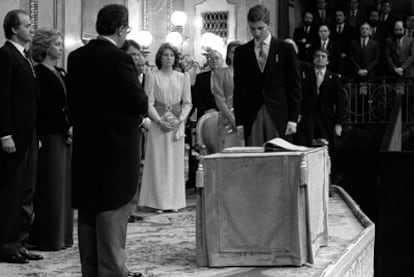A prince waiting in the wings
Felipe is ready to reign over Spain, says the palace, but King Juan Carlos may make him wait a little longer
On a Monday toward the end of January, a group of journalists convened at La Zarzuela Palace for a routine agenda meeting. Much to their surprise, the door opened and in walked a smiling Prince Felipe. The last time the crown prince made a surprise appearance at this type of gathering was in 2001 to announce the end of his relationship with Norwegian model Eva Sannum. This time, his only goal was apparently to greet the members of the press. Or was it?
Don Felipe turned 43 on Sunday, making him six years older than his father Juan Carlos when he ascended to the throne in the wake of Franco's death. Although there was no public event to underscore it, Sunday also marked 25 years since Felipe swore allegiance to the Constitution in a solemn session of Congress.
That youngster is now a married man with two daughters who seems relaxed in front of an inquisitive audience; he dodges no questions, not even the thorniest ones, and combines an institutional tone (he has yet to create controversy or veer an inch away from his mandated neutrality) with colloquial expressions - though without quite reaching his father's openness and spirit of bonhomie.
Prince Felipe is also the best-prepared heir in Spanish history: he holds a bachelor's degree in law from Madrid's Autónoma University, a master's degree in International Relations from Georgetown in Washington, and has graduated as an official from all three military academies.
Since 1996 he has visited all the Spanish regions and all the main cities - except for the highly sensitive North African enclaves of Ceuta and Melilla - and has traveled abroad 206 times. On many of these occasions he was representing Spain at the swearing-in of many Latin American rulers. "Except for Fidel, he is the person who best knows the region's leaders," they joke at La Zarzuela. In recent years, Prince Felipe has also been very active at the helm of several foundations.
Yet spokespeople for the royal family insist that the prince's agenda - or the prince and princess, since his marriage to former TV news anchor Letizia Ortiz in 2004 - remains steady and has not been speeding up recently. "Every year he attends an average of 320 official events and 50 public audiences, he delivers 62 speeches and receives 1,300 people," said one representative, knowing full well that any step forward by the son could be interpreted as a step back for the father. That is why, even though they admit that the prince has completed his training and is ready to become head of state whenever necessary, "the succession process is not open. There is no abdication operation underway," the Royal Palace insists.
The lung surgery that the king underwent last May, forcing the prince and princess to host the EU-Latin America summit in Madrid, gave rise to rumors that Don Juan Carlos himself encouraged when, on October 12, he joked that he was anxious to hand the throne over to his son after 35 years. To clear up any shadows he may have cast, the king said in his last Christmas address: "I happily fulfill my constitutional tasks in the service of Spain, and will continue to do so. It is no doubt my duty, but also my passion."
In the controversial 2008 book by the journalist Pilar Urbano (La reina muy de cerca, or The queen up close and personal), Doña Sofía was more emphatic: "Abdicate? Never! The king will never abdicate Only death should force a king to retire. The desirable thing is for the king to die in his bed and for someone to say: 'The king is dead, long live the king!'" Through his guidance of the state from a dictatorship to democracy, Juan Carlos won many admirers in Spain. What no one knows is how many Spaniards will continue to support the monarchy under his son.
Preparing his succession is King Juan Carlos' last remaining task. Some people argue that doing it during his lifetime would let him choose the right moment, since death is not often opportune. But it cannot be easy, knowing the last Spanish monarch who had a peaceful succession with no regencies, civil wars or regime changes was Carlos III. And that was 222 years ago.

Tu suscripción se está usando en otro dispositivo
¿Quieres añadir otro usuario a tu suscripción?
Si continúas leyendo en este dispositivo, no se podrá leer en el otro.
FlechaTu suscripción se está usando en otro dispositivo y solo puedes acceder a EL PAÍS desde un dispositivo a la vez.
Si quieres compartir tu cuenta, cambia tu suscripción a la modalidad Premium, así podrás añadir otro usuario. Cada uno accederá con su propia cuenta de email, lo que os permitirá personalizar vuestra experiencia en EL PAÍS.
¿Tienes una suscripción de empresa? Accede aquí para contratar más cuentas.
En el caso de no saber quién está usando tu cuenta, te recomendamos cambiar tu contraseña aquí.
Si decides continuar compartiendo tu cuenta, este mensaje se mostrará en tu dispositivo y en el de la otra persona que está usando tu cuenta de forma indefinida, afectando a tu experiencia de lectura. Puedes consultar aquí los términos y condiciones de la suscripción digital.








































